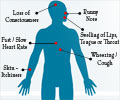A research has shed some light on how an enzyme prompts an allergic reaction, and how a vitamin dampens the inflammatory effect, in people with asthma.
A research has shed some light on how an enzyme prompts an allergic reaction, and how a vitamin dampens the inflammatory effect, in people with asthma.
A consortium of researchers led by Baylor College of Medicine in Houston found that the allergen breathed in by asthmatics triggers the enzyme MMP7, which activates a cascade of events to prompt an allergic reaction.Drs. Farrah Kheradmand and David B. Corry, both of whom are associate professors of Medicine-Pulmonary at BCM as well as senior authors of the study report, point out that that MMP7 particularly activates interleukin 25, a key mediator of the allergic response in the lung.
The research team have also found that a form of vitamin A made in the lung is critical for dampening the inflammatory effect.
While experimenting on mice, the researchers observed that the animals lacking MMP7 had higher production of retinal dehydrogenase, an enzyme that is responsible for synthesizing vitamin A in the lung.
They revealed that the MMP7 deficient mice showed less lung inflammation when exposed to allergens, compared to those that had enough of the enzyme.
When the researchers suppressed the production of vitamin A, the asthmatic symptoms in the MMP7 deficient mice were restored.
Advertisement
Kheradmand and Corry hope that future studies will help better understand the relationship between the synthesis of vitamin A in the body and the repression of MMP7. Research article on their most recent findings appears online in the journal Nature Immunology.
Advertisement
ARU/L














